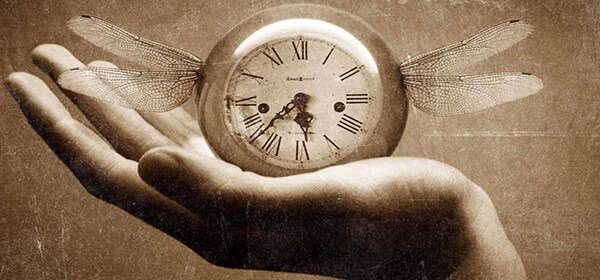Learn to Enjoy the Present, It Will Be With You the Rest of Your Life

The key to happiness seems to be related to using all of our senses and paying attention to the information that we receive from them: developing a full, present awareness. Numerous studies in the field of positive psychology have shown that psychological well being grows out of the ability to focus our mind on what is happening at the very moment we find ourselves in.
Living in the present moment requires a constant and progressive effort in our minds, which naturally tend more toward distraction. We live for the next thing that is going to happen to us and this leads us to emotional difficulties.
When our mind constantly lives worried about the future, anxiety will take over our present, and when our mind lives anchored in the past, sadness and despair will take over our days.
People are fragile when we do not stop to ask ourselves questions about the past and future, and we are strong when we experience every day without fear. The past and the future only exist in our thoughts; as such, the truly real lies in the present.
“Do not dwell in the past, do not dream of the future, concentrate the mind on the present moment”
-Buddha Gautama-
Living in the present modifies our brain
Dr. Andrew Newberg, a neuroscientist at Thomas Jefferson University, and Mark Robert Waldman, an expert in communication, maintain that living life focused on the present can change our brain. The word “present” has the power to influence the regulation of physical and emotional tension.

When we only focus on present tasks, we can change the way in which our brain works. Focusing our life in this way, we strengthen cognitive reasoning, which contributes to the reinforcement of areas in our frontal lobes.
Using positive words focused on what we are doing activates the brain’s motivation centers, urging them to act. In the extreme opposite case, when we use words that remind us of the past or anticipating what we are going to do, certain neurochemicals like cortisol contribute to stress and anxiety.
When we use negative words to remember our past, our brain’s fear center, the amygdala, is activated. When these words turn into thoughts, fear is activated, even if the situations that caused this are not present.
Human beings are programmed to worry. It is part of our primitive brain that protects us from dangerous situations. In fact, what was essential for our survival 10,000 years ago now suffers from overuse that only leads to us feeling anxiety in the face of what we cannot really act on because it does not yet exist and possibly will never come to be.
Always know what you are doing at all times; that is where true power is found.
We can only experience happiness in the present moment
We can imagine that we will be happy some day or remember times when we were, but the truth is that we can only be happy in the moment that we are experiencing. This does not mean that we must not set goals or organize our lives, but that doing it does not make us into procrastinators when we are overwhelmed by the reality around us, be this to enjoy it or to change it.
Accepting things as they are, without judging them and focusing on them in our mind at the present moment, is a way to control wandering thoughts that pull us away from full awareness. If we cannot avoid their appearance, we must at least let them go when they show up, refusing to hold onto them.

Remembering the negative circumstances from the past reduces our enthusiasm, our optimism, and as such, it makes the current moment bitter, limiting our potential and dispersing our energy. Even the memories of positive circumstances, if they are recurrent, affect our enjoyment of the present moment, as they also bring along a feeling of nostalgia, that idea that some past time was better.
The present is the only place where we can act on our reality and where we find opportunities. The first step to connect to it involves controlling actions like breathing. Only through this conscious effort will our senses open up.
Images courtesy of Claudia Dinora
The key to happiness seems to be related to using all of our senses and paying attention to the information that we receive from them: developing a full, present awareness. Numerous studies in the field of positive psychology have shown that psychological well being grows out of the ability to focus our mind on what is happening at the very moment we find ourselves in.
Living in the present moment requires a constant and progressive effort in our minds, which naturally tend more toward distraction. We live for the next thing that is going to happen to us and this leads us to emotional difficulties.
When our mind constantly lives worried about the future, anxiety will take over our present, and when our mind lives anchored in the past, sadness and despair will take over our days.
People are fragile when we do not stop to ask ourselves questions about the past and future, and we are strong when we experience every day without fear. The past and the future only exist in our thoughts; as such, the truly real lies in the present.
“Do not dwell in the past, do not dream of the future, concentrate the mind on the present moment”
-Buddha Gautama-
Living in the present modifies our brain
Dr. Andrew Newberg, a neuroscientist at Thomas Jefferson University, and Mark Robert Waldman, an expert in communication, maintain that living life focused on the present can change our brain. The word “present” has the power to influence the regulation of physical and emotional tension.

When we only focus on present tasks, we can change the way in which our brain works. Focusing our life in this way, we strengthen cognitive reasoning, which contributes to the reinforcement of areas in our frontal lobes.
Using positive words focused on what we are doing activates the brain’s motivation centers, urging them to act. In the extreme opposite case, when we use words that remind us of the past or anticipating what we are going to do, certain neurochemicals like cortisol contribute to stress and anxiety.
When we use negative words to remember our past, our brain’s fear center, the amygdala, is activated. When these words turn into thoughts, fear is activated, even if the situations that caused this are not present.
Human beings are programmed to worry. It is part of our primitive brain that protects us from dangerous situations. In fact, what was essential for our survival 10,000 years ago now suffers from overuse that only leads to us feeling anxiety in the face of what we cannot really act on because it does not yet exist and possibly will never come to be.
Always know what you are doing at all times; that is where true power is found.
We can only experience happiness in the present moment
We can imagine that we will be happy some day or remember times when we were, but the truth is that we can only be happy in the moment that we are experiencing. This does not mean that we must not set goals or organize our lives, but that doing it does not make us into procrastinators when we are overwhelmed by the reality around us, be this to enjoy it or to change it.
Accepting things as they are, without judging them and focusing on them in our mind at the present moment, is a way to control wandering thoughts that pull us away from full awareness. If we cannot avoid their appearance, we must at least let them go when they show up, refusing to hold onto them.

Remembering the negative circumstances from the past reduces our enthusiasm, our optimism, and as such, it makes the current moment bitter, limiting our potential and dispersing our energy. Even the memories of positive circumstances, if they are recurrent, affect our enjoyment of the present moment, as they also bring along a feeling of nostalgia, that idea that some past time was better.
The present is the only place where we can act on our reality and where we find opportunities. The first step to connect to it involves controlling actions like breathing. Only through this conscious effort will our senses open up.
Images courtesy of Claudia Dinora
This text is provided for informational purposes only and does not replace consultation with a professional. If in doubt, consult your specialist.







